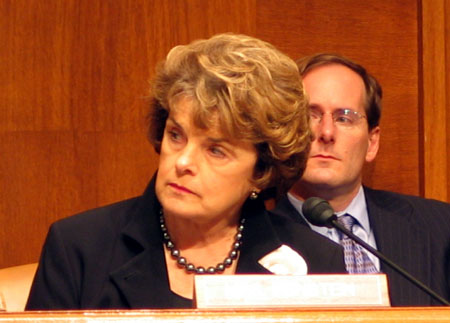Senator Dianne Feinstein ’55, D.-Calif., retained her chair in Tuesday’s midterm elections against former California State Senator Kevin de Leon, D., in what has been reported as her fifth and final term for U.S. Senate.
Dissenters of Feinstein claim her age would limit her ability to represent, calling for a newer, younger voice to represent the largely Democratic state. De Leon claimed that the Senate needed a “new voice” and “new vision,” saying that he would offer more progressive values throughout his campaign, according to a New York Times article published Nov. 2.
“We need Democrats in Washington, D.C., that have the courage of their convictions, to not just be on the sidelines but on the front lines,” de Leon said during the race’s only debate on Oct. 17.
Feinstein was first elected to the U.S. Senate in 1992 after serving as San Francisco’s first female mayor. She is the oldest senator currently serving at 85 years old. De Leon was first elected to legislature in 2006 as a member of the state assembly before becoming part of the state senate in 2010 and Democratic Party leader of the state senate in 2014. Feinstein contends that the Senate requires a range of seniority and experience levels to represent the aging population of the United States.
“My opponent always uses seniority derogatorily,” Feinstein said in the interview with The New York Times. “But it has advantages in the Senate.” Feinstein added that “it should be a government of all people. America is growing more elderly.”
“I’m very pleased to hear that Senator Feinstein has been re-elected by the voters of California: I think she’s [shown] proven leadership within the Senate and is a strong representative of California as a state,” said Gabe Rosen ’19, President of Stanford Democrats which endorsed Feinstein. “I still want to applaud de Leon for all that he has done on behalf of communities that have traditionally been marginalized within California society.”
Feinstein drew national attention during the confirmation hearing battle over Supreme Court Justice Brett Kavanaugh, when it was revealed that the Senator received a letter from Palo Alto University professor Christine Blasey Ford alleging Kavanaugh sexually assaulted her in high school.
Feinstein kept the letter confidential for several weeks before turning it over the the Federal Bureau of Investigation, according to the Associated Press. U.S. President Donald Trump and Kavanaugh supporters accused Feinstein of leaking the letter to the press in an attempt to derail Kavanaugh’s confirmation, which Feinstein denied.
Feinstein said that the election and her relationship with Trump did not affect her decision to run again, according to the interview with The Times, despite his verbal attacks on her age during the Kavanaugh hearings.
“[Trump will] take anything he can,” Feinstein told The Times. “I think I’m in good physical condition. It’s the same way he attacked the F.B.I. I don’t know how long you can be president by offending everybody. I think we are going to find out.”
Contact Gillian Brassil at gbrassil ‘at’ stanford.edu.
